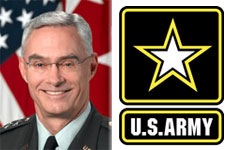Army
-
A top App for Army is the Disaster Relief app for an Android
August 09, 2010 -
The service names 25 software tools as winners in the Apps for the Army contest. Lt. Gen. Sorenson says the competition proves agile software development can be done well in the Army. He says a new memo is coming out that will change how the Army develops apps in the future.
August 05, 2010 -
Sgt. Mark Todd tells the DorobekInsider that he was \"just doing his job\".
August 03, 2010 -
Every soldier to be sent to Afghanistan will soon be required to complete language and culture training before being allowed to deploy. Federal News Radio gets the details of how that will be done from Col. Dino Pick, Commandant of the Defense Language Institute.
August 03, 2010 -
The suspect was returned to the United States from a base in Kuwait Thursday.
July 30, 2010 -
The Army is no longer using the term \"psychological operations\" for the unit in tasked with changing minds behind enemy lines. They say it sounds threatening. Now it\'s going to be called Military Information Support Operations. A U.S. Special Operations Command spokesman says more the new name more accurately reflects the unit\'s job of producing leaflets, radio broadcasts and loudspeaker messages to influence enemy soldiers and civilians.
July 15, 2010 -
The draft copy from June 15 of the document that describes how the Army thinks it will fight between 2016 to 2028
July 08, 2010 -
Ten days after the original announcement from officials, concerned families have started to get calls back.
June 23, 2010 -
Army Lt. Gen. Jeff Sorenson has been in demand over the last year. He explains why this week. May 20, 2010
May 18, 2010 -
Amtower interviews James Lloyd, Program Director for the Veteran-Owned/Service Disabled Program at the US Army Office of Small Business Programs. May 17, 2010
May 17, 2010 -
Over a year ago, the U.S. Army, and other branches of the military, were experimenting with the use of the virtual worlds social media site \"Second Life\" as a recruitment tool. Since that time, the military has branched out into using virtual worlds technology as a tool for collaboration. Now, civilian branches of government are looking to do the same thing. Federal News Radio\'s Max Cacas has our exclusive coverage of the Third annual Federal Consortium for Virtual Worlds Conference, which concludes today at the National Defense University here in D.C..
May 14, 2010 -
On April 14, Army Secretary John M. McHugh personally awarded Medical Communications for Combat Casualty Care (MC4) Program Management and Business Transformation Director William H. Weed with the Decoration for Exceptional Civilian Service (DECS) Award during a ceremony at the Pentagon. The DECS, comparable to the military\'s Distinguished Service Medal, is the highest award granted by the Secretary of the Army to Army civilian personnel. Weed tells us about what he did that was so special.
May 07, 2010 -
Franklin Graham says the Army has withdrawn an invitation for him to appear at a special Pentagon prayer service. The Christian evangelist said he regrets the Army\'s decision but not stop praying for the troops. Graham, the son of legendary evangelist Billy Graham, has described Islam as evil in the past. The Military Religious Freedom Foundation raised the objection to the appearance, citing Graham\'s past remarks about Islam.
April 22, 2010 -
The Commission on Wartime Contracting in Iraq and Afghanistan wants to know how the Army is doing in administering services contracts.
April 21, 2010





